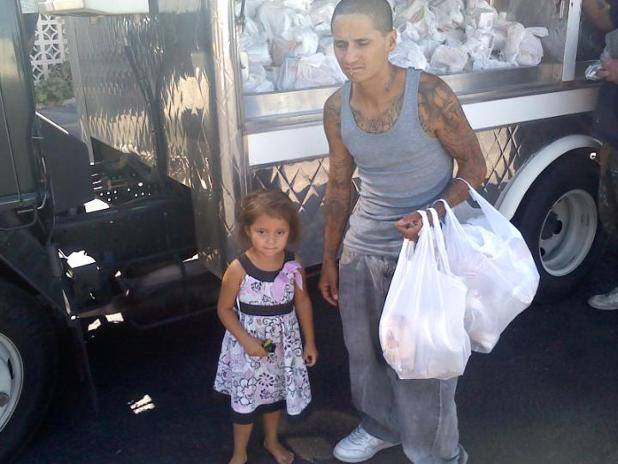By Jeremy Reynalds, Ph.D.
Founder and CEO
Joy Junction Inc.
It was just a typical Facebook update, and not one to which we expected such a reaction.
Here is the post accompanying this picture. “This man and little girl now have food and water to enjoy for dinner. They were grateful for the gifts they received from our Lifeline of Hope today!”
It generated this surprising (and shocking) response from Denise (not her real name). She wrote, “Unfortunately a lot of these ‘homeless’ or ‘less fortunate’ people aren’t really telling the truth. I know a ton of them that beg for money on I25 and Montano on the corner that are staying in that InTown Suites and paying $220+ a week to stay there. They also use all the money they get on drugs.”
I responded, “Denise, that might well be the truth, but it leads to the question, ‘What next?’”
I continued, “A number of people who stay in establishments like the one you mentioned do so because credit checks and utility deposits prevent them from getting a more regular form of housing. Drug addiction is not easy to deal with. You cannot stay at Joy Junction and be an active user, but we do help after a user has been chemically detoxed.
“However, the county detox here (a very good facility) won’t help you if you have any active warrants, causing a lot of individuals who might otherwise seek help to go elsewhere. The situation is very complex, outside the scope of effective city assistance, and needs state and federal intervention on a variety of levels. What we can’t do, though, is to ignore it. That notwithstanding, thanks for your input.”
Not to be outdone, Denise kept the debate going. She replied, “Sounds like a ton of excuses to me. Don’t beg other people for their hard earned money because you have a sob story and then just buy drugs with it.”
Others had a more compassionate response. Jesseca wrote, “Then don’t get involved and don’t share your hard earned money. If it’s not given with a happy heart, then the action means nothing because it was not genuine.”
Way to go, Jesseca!
Dawn jumped in, and was kind enough to do the math. She said that if subject (s) of Denise’s post are paying $880 for rent and utilities, and spending say $100 a week on drugs (most addicts spend more than that), then they are panhandling for $1280 a month.
She said, “So what? Does this mean we should turn our backs on addicts?”
Dawn echoed my perspective, that addiction is not “fun,” just as living in a hotel with only a few possessions isn’t fun either.
She continued, “ Would it be better if they were NOT staying at that hotel (and) … detoxed on the streets of Albuquerque? We can always go back to the point of, “Well, they made a choice to become addicts.”
Dawn then made a basic, but apparently often forgotten conclusion, that once addiction happens, the choice is gone.
She added, “Also, how do we know if we lived their lives, walked in their shoes, that we would not be worse addicts? How can we be sure? Addiction and homelessness is a complex problem and issue. The solution is not to ignore them or not offer help. As human beings, it is our responsibility to be kind, compassionate, and to love our neighbor as ourselves, in my opinion. Not jumping on you Denise. I just see it differently.”
Gia echoed what we know to be true-that once addiction happens the choice IS gone.
She said, “I’ve watched normal people go through this, and before they know what hit them its too late. Many hate their own addiction and want to get better, but for that they have to detox and depending on what they are on, the ‘sick’ that happens is really bad and hard to go through. Staying addicted is what they have to do to be ok.”
Dawn got back in on the discussion, adding that Denise certainly has a right not to share her resources because someone has a sob story.
“It’s your right to be that type of person,” she said.
“However,” she continued, “I will always choose differently. I’d rather err on the side of the sob story than to turn a blind eye to pain and suffering. All the great spiritual teachers of times past … taught to help the poor and suffering amongst them.”
Dawn added, “Love, compassion, kindness is our duty as human beings, in my opinion.”
She continued, “Good and bad are concepts we assign to behavior we find offensive. However, maybe we would have the same or worse behavior if we went through what they did in life. Addiction is not fun. It hurts.”
Vanessa really summarized it, writing “We should never judge anyone for any reason. We never know what they have been through.”
But what do you think? Did Denise have a point, or was she insensitive? If you do agree with her, what should be our response to addicts?



